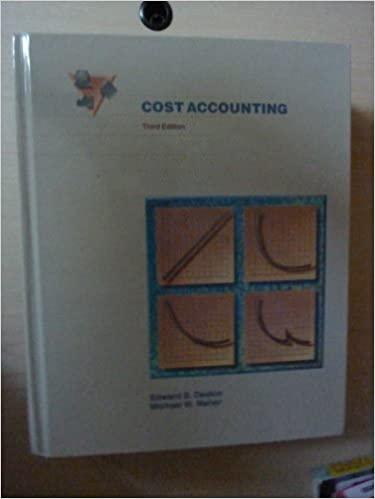Effect of Cost Allocation on Pricing and Internal versus External Buy Decisions: Indio Agresearch is a large
Question:
Effect of Cost Allocation on Pricing and Internal versus External Buy Decisions: Indio Agresearch is a large farm cooperative with a number of agriculture-related manufacturing and service divisions. As a cooperative, the company pays no federal income taxes. The company owns a fertilizer plant, which processes and mixes petrochemical compounds into three brands of agricultural fertilizer: Greenup, Maintane, and Winterizer. The three brands differ with respect to selling price and with respect to the proportional content of basic chemicals. The fertilizer manufacturing division transfers the completed product to the cooperative's retail sales division at a price based on the costs of each type of fertilizer plus a markup.
The manufacturing division is completely automated so that the only costs in- curred are costs of the petrochemical feedstocks plus overhead that is all considered fixed. The primary feedstock costs $2 per pound. Each 100 pounds of feedstock can produce either of the following mixtures of fertilizer:

Production is limited to the 900,000 kilowatt-hours monthly capacity of the de- hydrator. Due to different chemical makeup, each brand of fertilizer requires different dehydrator use. Dehydrator usage in kilowatt-hours per pound of product is:

Monthly fixed costs are $75,000. Now the company is producing according to output schedule A. Joint production costs including fixed overhead are allocated to each product on the basis of weight.
The fertilizer is packed into 100-pound bags for sale in the cooperative's retail stores. The manufacturing division charges the retail stores the allocated costs plus a 50 percent markup. The sales price for each product charged by the cooperative's retail sales division is as follows:

Selling expenses are 20 percent of the sales price. Identical chemical fertilizers may be acquired by the retail division from other manufacturers and wholesalers at the following prices per pound:

The manager of the retail division has complained that the price charged for Maintane is excessive and that he would prefer to purchase Maintane from another supplier.
The manager of the manufacturing division argues that the processing mix was determined based on a careful analysis of the costs of each product compared to the prices charged by the retail division. As was noted previously, a certain amount of Maintane must be produced. The manufacturing manager stated, "It is not reason- able to allow the retail division to purchase from the outside because the manufactur- ing division would then be left with Maintane on hand that would have to be sold to outsiders. After selling and delivery expenses, the manufacturing division would only realize $5.30 per pound, which is less than cost."
Required:
a. Assume joint production costs including fixed overhead are allocated to each product on the basis of weight. What is the allocated cost per pound of each product, given the current production schedule?
b. Assume joint production costs including fixed overhead are allocated to each product on the basis of net realizable value. What is the allocated cost per pound of each product, given the current production schedule?
c. Assume joint production costs including fixed overhead are allocated to each product on the basis of weight. Which of the two production schedules produces the higher operating profit to the firm as a whole? What is the maximum monthly operating profit that can be obtained by the firm?
d. Would your answer to part
(c) be different if joint production costs including fixed overhead are allocated to each product on the basis of net realizable value? If so, by how much?
Step by Step Answer:






